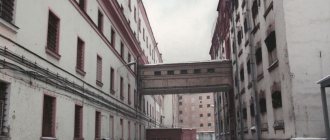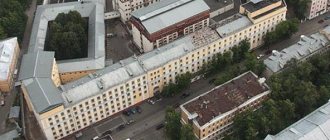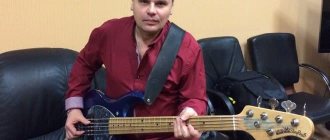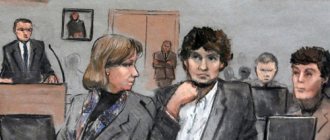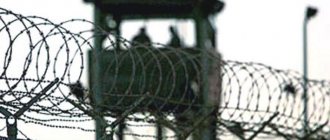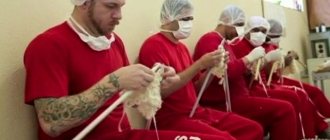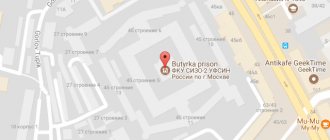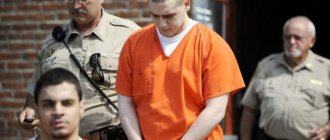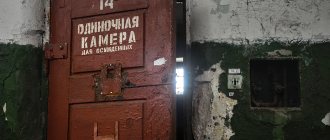What it is?
The Matrosskaya Tishina prison is located in Moscow on the street of the same name.
Throughout its existence, the isolation ward has repeatedly changed its status and undergone reconstruction.
At the moment, on the territory of the prison there are several buildings, a hospital for prisoners and numerous outbuildings.
According to official information, the area of the cells reaches 12 square meters. meters , each of which contains 3-4 prisoners (in practice, the prison is constantly overcrowded). Particularly dangerous criminals are kept in solitary confinement.
- Prison address: Moscow, Matrosskaya Tishina Street, building 18.
- Telephone number:.
- E-mail address:
- Infrastructure: three secure buildings (capacity up to 2000 prisoners).
- The official name of the prison: Pre-trial detention center No. 1 (Federal budgetary institution IZ-77/1 Federal Penitentiary Service of Russia for Moscow).
Escapes from Sailor's Silence
The legendary Russian assassin Alexander Solonik is known not only for carrying out orders to eliminate lawmen and crime bosses. During his life, Solonik managed to make three successful escapes, the last of which became a classic, on which many feature films were made - he escaped from Sailor's Silence.
On May 5, 1995, it became known that the famous killer Alexander Solonik made a daring escape from the Matrosskaya Tishina prison; he was kept separately and alone. At 1.20 the pre-trial detention center officers were making a round, and it turned out that guard Sergei Menshikov was not in his place. Checking the cells for the presence of prisoners in them, it was discovered that there was no killer in his “solitary cell”. After a thorough inspection of the facility, the conclusion was disappointing - neither the killer nor the prison officer was anywhere.
The operatives found out that the guard not only helped Solonik escape, but also went the whole way with the killer: the fugitives climbed onto the walking platform of the 9th building, from where they climbed the wall, and from there, using a pre-prepared rope, they descended to Matrosskaya Tishina Street. After the escape, no one else saw the sergeant on duty that night; some believe that Solonik himself dealt with him.
On March 13, 2003, convict A. Delgura did not show up for morning verification. Delgura was convicted of a minor violation of the law, so he was listed in the household department of the pre-trial detention center, and could move freely around the institution. Later, the fugitive was found in the sanitary checkpoint, where he was hiding from the guards.
In the same year, in September, Vasily Slavgorodsky, a native of the Republic of Belarus, escaped from Matrosskaya Tishina. The criminal (36 years old) managed to knock out several bricks from the fence of the exercise yard, then, having climbed out into the hole, he managed to jump over the outer enclosing wall and escaped. Slavgorodsky “ran” until May 2004, after which he was detained.
On May 2, 2004, defendant Alexander Ershov, accused of illegal sale of narcotic substances, escaped from the Matrosskaya Tishina pre-trial detention center. Ershov, like Slavgorodsky, made a hole in the wall while walking, only after that he climbed onto the roof of the warehouses and walked along the roof to the main fence, which is located close to the buildings. In one leap he jumped over this “barrier” and found himself free. Within two days he was caught in Lyubertsy.
Oleg Topalov, who was facing a long sentence on two counts - premeditated murder and illegal sale of weapons, managed to make a hole in the ceiling through which he escaped to freedom. Oleg Topalov is recognized as mentally ill with a tendency to escape. The escape from the Sailor's Silence pre-trial detention center was accidentally filmed by Oleg Topalov, watch the story:
Why is it called that?
In 1771, Peter was the first to create a sailors' settlement on the banks of the Yauza River. Its main population was old sailors who repeatedly took part in naval battles. For health reasons, most of them needed rest.
A special decree was issued prohibiting movement on all types of transport of that time. Thanks to this restriction, the street became quiet.
People called it Sailor's Silence. This name has been retained to this day . Due to the location of the prison, its name arose.
Matrosskaya Tishina Pre-trial Detention Center 1 now
Today, the Matrosskaya Tishina prison is conditionally open to representatives of the media and various public organizations. From time to time, excursions of sorts are held there to show the life and living conditions of prisoners.
Naturally, during such events, visitors are shown the best cameras, recreation areas, and so on. In contrast to this, periodically there are reports in the media about violations of the rights of prisoners, non-compliance with detention standards, hunger strikes, riots, escape attempts, deaths and other unpleasant moments, which allow us to judge that not everything is so smooth in pre-trial detention center No. 1.
Moreover, such disadvantages are observed not only in terms of the maintenance of prisoners. So, about a year ago, information appeared that a reduction in the staff of the Federal Penitentiary Service led to their significant reduction. This gave rise to concerns on the part of the guards of pre-trial detention center No. 1. As employees of the penitentiary service admitted, due to the reduction in the number of guards, it became simply dangerous to work.
History of creation
The history of Sailor's Silence begins in 1775 , when a special isolation ward was created for the so-called pre-insolent.
Anyone who committed petty crimes (robbers, thieves, swindlers) was sent to prison.
Subsequently, the status of the isolation ward began to change. The modern prison has existed since 1985 . During its existence, administrative buildings were repeatedly reconstructed, new buildings appeared, and conditions for prisoners were improved.
A Brief History of the Prison:
- 1775 - home for the pre-insolent;
- 1870 - Moscow correctional prison;
- 1912 - expansion of the prison territory;
- 1917 - Reformatory for those under 21 years of age;
- 1945 - prison No. 14;
- 1947 - expansion of the prison territory (barracks and numerous outbuildings appeared);
- 1949 - the third building of the prison was built;
- 1950 - the number of floors of the facilities was increased (two buildings began to have five floors), prison No. 1;
- 198 - pre-trial detention center No. 1.
How to get to the Vladimir Central Prison Museum? Read about it here.
History of the Straithouse since 1775 to this day in this video:
The case of VIP cameras
In 2021, a scandal erupted and several people were removed from leadership positions. The thing is that so-called “VIP cells” were discovered in the prison, equipped with greater amenities than the others. They were completely renovated, had a plasma TV, a refrigerator, high-quality furniture, showers, a separate toilet, etc. Only fairly wealthy inmates could enjoy such conditions - mostly thieves or dangerous swindlers.
VIP chamber interior
In VIP cells it was allowed to use mobile phones; if desired, a person could sit in such a cell alone or with other people (who were also asked for their consent). As a justification, the prison authorities cited the argument that the proceeds from such cells go to improve the living conditions of other prisoners.
When news of the VIP conditions leaked to the media, representatives of the Federal Penitentiary Service wrote in every possible way that in fact there were no special cells - some were simply lucky with the repairs, and others were not. However, former prisoners claim that for a bribe you can use, for example, a mobile phone even in a regular cell. Also, some concessions are granted to patients - they may sometimes be allowed to order food separately, including from catering establishments (restaurants, cafes).
Is there an official website?
Sailor's Silence has two official websites https://www.sizo-matrosska.rf and https://www.sizo-1.ru/.
Detailed information about the isolation ward is available on the website https://www.77.fsin.su. Additional information about the history of the prison, significant events associated with its prisoners and other data can be found on numerous websites dedicated to the crime topic.
The official resource contains complete information about Matrosskaya Tishina, including the schedule for receiving citizens, features of the detention of prisoners, management contacts, etc.
What kind of criminals end up here?
Matrosskaya Tishina is a detention center for ordinary and special prisoners .
Criminals who have committed serious crimes and other illegal acts serve their sentences here.
Those sentenced to a fixed or life sentence can go to this prison. In the pre-trial detention center, detainees, persons under investigation and those under trial are awaiting the court decision and the outcome of the investigation. In the future, these categories of citizens may be transferred to other prisons .
Is it true that the Black Dolphin prison is located in Sol-Iletsk? Find out the answer right now.
Schedule
The daily routine of the inmates in Matrosskaya Tishina does not differ from the generally established rules . Rise is at 6:00, lights out at 22:00. During the day, sleeping or lying on the beds is prohibited.
Inmates are notified about the time of awakening and the need to prepare for bed by a special sound signal.
For a long time, Matrosskaya Tishina was overcrowded, so the convicts had to sleep in several shifts (due to a lack of sleeping places).
daily routine :
- Breakfast is served at 6:30 (the menu is no different from lunch and dinner, the diet consists of the first, second course and tea).
- Residents are given the opportunity to spend fifteen minutes a week in the bathhouse or take water treatments in the shower.
- Walks are held daily in a specially equipped and protected area (on average, one walk lasts an hour).
- The lighting devices in the cells operate around the clock (after 22:00 they are switched to night mode).
- inspections are carried out daily from 8:00 to 9:00 (during the shift change of the convoy, complaints and wishes of the inmates are collected).
Who is sitting in the "Black Dolphin"? The list of prisoners is on our website.
Reception schedule for citizens
Reception of citizens by the prison management is carried out on weekdays from 14:00 to 16:00 (on weekends the reception is conducted by the person responsible from the management).
Applications for clothing and food donations for convicts and visits with them are freely available on the official website of the prison.
The transmission bureau operates according to a specific schedule, deviations from which are unacceptable.
Schedules for working with citizens and relatives:
- registration of documents and acceptance of transfers is carried out from Monday to Thursday from 9:00 to 16:00 (from Friday to Sunday from 9:00 to 14:45);
- delivery of packages to recipients is carried out from Monday to Friday from 16:00 (from Friday to Sunday from 14:45);
- short-term visit bureau is open from Monday to Thursday from 9:30 to 16:00 (on Friday from 9:30 to 15:00, on Saturday from 9:30 to 14:00, on Sunday the housekeeping team is open);
- applications for the current day are accepted from 9:30 to 11:15, the next day - from 13:00 to 16:00 (work with accepted applications is carried out from 11:15 to 12:30);
- receives citizens from 9:00 to 18:00 from Monday to Thursday, on Friday from 9:00 to 16:45 (reporting documentation is completed from Monday to Friday from 9:00 to 9:30, requests for calls for prisoners, suspects and accused are carried out from Monday to Friday from 9:30 to 17:00, on Friday from 9:30 to 15:45);
- break daily from 13:00 to 13:45.
Everyday life in a Kremlin prison - a look from the inside
Photo: Alexander Vilf / RIA Novosti Revenge of the offended Prosecutor General, deep “freezing” in a privileged isolation ward, a space landing attack, disclosure of medical confidentiality and interception of secret correspondence. All this, as well as how the FSB general put pressure on the Prosecutor General’s Office and why ex-Minister Kuznetsov, near Moscow, does not lose his mood and appetite - in the prison stories of the ex-head of the Serpukhov region.
“My publications that the Prosecutor General’s Office is taking revenge on me for the case of gambling prosecutors and the arrest of Prosecutor General’s Office employee Sergei Abrosimov , as well as a detailed breakdown of fictitious charges and mythical ten billion, caused an inadequate reaction from the supervisory department headed by Yuri Chaika .
Offended, among other things, by his sons (let me remind you that Artem Chaika was called the leader of the prosecutor’s gang in a criminal gambling case, and Igor Chaika was not happy with my fight against the Lesnaya landfill), he intervened to turn my already difficult situation into behind bars in a living hell. As it became known, Chaika’s deputy complained to the Ministry of Justice of the Russian Federation about my lawyers, allegedly they were passing on to me some information that was not relevant to the case.
Everyone knows very well that 99% of prisoners have mobile phones in prisons and transmit any amount of any information. Why Chaika is indifferent to this fact, and he is only concerned about Shestun, although I have always been in special units with a particularly strict regime, including the Lefortovo prison, and have never held a phone in my hands in 8 months, is quite understandable.
The son of the Prosecutor General, Igor Chaika, when he was an adviser to the governor of the Moscow region in the government building of the Moscow region, personally told me: “You are the enemy of the family” and ordered me not to approach him. No matter how hard the blue uniforms try to prove with foam at the mouth and false theatricality that Shestun is an ordinary citizen, with all their actions they only confirm the opposite.
After the prosecutor’s complaint to the Ministry of Justice, in the 6th special block of “Matrosskaya Tishina”, daily harsh searches began in the cells with the turning over of all things, and the detention center employees began to take away papers constituting attorney-client privilege from my defenders.
Moreover, I am still denied hospitalization for my main illness, and let me remind you, I have diabetes, tortuosity of the carotid artery with 64% stenosis, loss of consciousness and, as a result, a high risk of ischemic stroke.
On February 6, I, together with two cellmates, went on a second hunger strike demanding that the lawlessness be stopped and that I be hospitalized in the Bakulev Center. A whole group of doctors came to me and offered to send me to the “Cat House” - a psychiatric hospital in Butyrka prison. I wondered why I needed “Cat House”; I needed treatment for stenosis, diabetes and cardiovascular diseases. I often lose consciousness and my condition worsens.
However, the next day, instead of being transferred to a hospital, I was imprisoned in pre-trial detention center 99/1 of the FSIN, or “Kremlin Central”. I am sure that the heroes of my publications contributed to this, because they get here solely by order from the very top.
This Lefortovo branch is widely known for its “freezing” - a complete lack of communication with the outside world. On top of that, investigator Roman Vidyukov has been prohibiting me from seeing my family for two months now, and the staff of pre-trial detention center 99/1 is deliberately preventing me from meeting with my lawyers; Despite the fact that they line up at 9 am, they are launched only at the end of the working day, 10 minutes before the closing of lawyers' offices.
At the same time, the FSI officers take away documents related to the case from the defenders and stand with a video recorder a meter from the table while I communicate with the lawyers.
There are not even letters in this prison, because as soon as I arrived at the Kremlin Central, the censor went on vacation for almost two months! Coincidence?
Let me remind you that in November, when I was being transferred from pre-trial detention center-2, the management of the Kremlin Central refused to take me, saying that “Shestun is a scoundrel.” They know how many complaints I wrote about corruption violations at Lefortovo, and they did not want to accommodate such a rebel.
However, there are also advantages here. The living conditions in pre-trial detention center 99/1 are very tolerable; I now have a large cell that I can even walk around. True, because of the hunger strike, I don’t play sports - I save my strength. The cell has a refrigerator and a TV. But, as usual, they took away my glucometer and will not give it back, which, given my diabetes, is a direct threat to life and health.
This detention center, like Lefortovo, is famous for its VIP prisoners, so now new heroes will appear in my notes.
Nikolai Pavlinov , a famous resident of the city of Chekhov, is in cell 601 He is charged with the most terrible article of the criminal code - organizing a criminal community for the allegedly illegal acquisition of land and buildings, but in his freedom Nikolai built churches, an ice palace in Chekhov, financed the Vityaz hockey club, boxers Povetkin and Lebedev.
Pavlinov’s neighbor, Sergei Shchipantsev (Malysh), became famous after a scandal with beatings and extortion in the Moscow pre-trial detention center-4 Medvedkovo, after which even the head of the prison, Alexei Khorev, . The kid, as part of the Lyubertsy organized crime group, received a sentence for robbery - eight years of maximum security and was transferred to a correctional colony in Vladimir.
Taking into account the time spent in the pre-trial detention center, which is 6.5 years, Malysh did not stay in the colony for long and after three months he was preparing for parole. However, two days before his freedom, he was transferred to the Kremlin Central and a new criminal case was opened regarding the events in Medvedkovo.
I am sitting in cell 506, and next door, in cell 501, lives the mayor of Vladivostok, Igor Pushkarev . The head of the “K” department of the FSB, General Ivan Tkachev , urging me to write a letter of resignation, boasted about how he “rolled up” the “tsar and god of Vladivostok.”
“He was the coolest, they carried him in their arms!” - Ivan Ivanovich spoke about the attitude of the residents of the Far Eastern capital towards the head, but this did not stop Pushkarev from being arrested out of nowhere and slapped with a whole bunch of articles of the Criminal Code of the Russian Federation - 201, 204, 285, 290, 291, 327 - abuse of power, commercial bribery, bribery ...
According to the law, the consideration of the merits of the case of Igor Pushkarev should have taken place in the Primorsky Territory, at the place of the crime charged, however, General Tkachev, well aware that the judges of Vladivostok may not follow the lead of the central apparatus of the FSB and pass an objective verdict, personally, with his signature , wrote a petition to Deputy Prosecutor General of Russia Viktor Grin to change the territorial jurisdiction of the case. Grin, of course, could not disobey Tkachev, so the hearings on the case of the mayor of Vladivostok are held in the Tverskoy Court of Moscow, which in terms of the quality of crooked justice can compete with Basmanny.
Former Minister of Finance of the Moscow Region Alexey Kuznetsov was in cell 609. He ate everything - both gruel and food from additional nutrition, he had an excellent appetite, he was very clean and modest. Alexey Viktorovich slept on the second tier, wrote poetry all the time and read the works of Nietzsche and Freud, taken from the prison library, and wrote out their quotes in his notebook.
The ex-Minister of Finance of the Moscow Region has a 30-year-old girlfriend in Paris, whom he wants to marry as soon as he is released. He has four children, one daughter with Jeanne Bullock , she works in the United States for Hillary Clinton's . There is also a 32-year-old eldest son and two daughters from his previous wife, they also live abroad.
Ten years ago, Kuznetsov quarreled with his mother and still does not speak to her. The conflict arose over his sister, who was imprisoned for 7 years in his criminal case. She is serving her sentence in the Kostroma colony - the same one where my deputy Elena Bazanova , who was arrested in the midst of my fight against the Moscow prosecutor’s gang that was protecting the casino.
Elena Yuryevna was detained by the GUEBiPK, the entire top of which, a few years later, ended up in prison on charges of fabricating criminal cases and organizing a criminal community, and the head of this elite unit of the Ministry of Internal Affairs, General Denis Sugrobov, received 12 years in prison.
Before being transferred to the Kremlin Central, Alexey Kuznetsov had already served six years in France, including two years under house arrest. He was promised the most comfortable pre-trial detention center in Moscow - pre-trial detention center 99/1, here there really are the best living conditions. He was also guaranteed that he would sit in the Bryansk colony after the verdict, and his criminal case of 150 volumes would not change in any way, he would simply be announced a sentence and sent to a zone, taking into account the time he served abroad. Kuznetsov is very optimistic.
In France, it was comfortable in a pre-trial detention center, alone in a cell with an area of 20 square meters, where there was a TV, a refrigerator, unlimited phone calls, video game consoles, and so on. There were few Russians in prison, mostly Arabs, but there were also Ukrainians and Armenians.
Many remember how in 2009, unofficially, on the eve of the New Year holidays, Vladimir Putin strongly discouraged Russian officials from appearing at fashionable Alpine resorts. However, in the French Courchevel, journalists caught the president of the Olympic Committee Leonid Tyagachev , and the director of the FSO Evgeny Murov , and the fugitive Minister of Finance of the Moscow Region Alexei Kuznetsov , and the head of the Central Election Commission of United Russia Andrei Vorobyov , who, seeing that he was recognized, tried to hide in order to avoid a scandal .
Moreover, in a narrow circle it was rumored that Vorobiev, together with Tyagachev and Murov, celebrated the New Year together with Kuznetsov and even negotiated on how to solve the problems of the ex-Minister of Finance.
I had another court hearing scheduled for February 12 to extend my arrest. As always, I prepared a diatribe on several pages to deliver in the presence of my associates and a large number of journalists, and took it with me along with other necessary documents.
But it was not there! The guards tried to take my papers away. In the eight months of my journey through Moscow prisons, and I have already changed six isolation wards and several dozen cells, this was the first time I encountered such impudence and lawlessness. Of course, no one had the right to take away my court documents on any legal basis, and I refused to give them up.
The guards, without thinking twice, decided to use space landing forces against me. About twenty FSIN officers in pressure helmets came at me, threw me onto the asphalt in front of the paddy wagon and beat me for a long time with rubber batons, jumping on me. I was barely alive, my whole body ached, it hurt to breathe. These cosmonauts worked very skillfully, leaving virtually no external damage, only small hematomas, but they knocked out my kidneys. A little later, a severe headache and vomiting developed. I couldn’t even really walk on my own.
In this state, I was loaded into a paddy wagon, where other prisoners of pre-trial detention center 99/1 were already sitting, who heard me being beaten. I personally met the mayor of Vladivostok, Igor Pushkarev, . He treats me with respect. I promised to testify at his trial about the threats of FSB General Tkachev and the political nature of the persecution of Pushkarev.
As soon as we got to the Basmanny Court, I asked to call an ambulance. The paramedics arrived and said that I needed to be taken to the emergency room, but the guards forbade me to do this, and I was not provided with medical assistance.
A huge number of journalists with television cameras gathered to extend the arrest. Basically, these were federal TV channels - Channel One, Ren, Zvezda - which exclusively gave reports denigrating me. To be honest, I thought that the arrest of Senator Rauf Arashukov had completely interrupted my story, and interest in me should subside, but since the television people had gathered so closely together, nothing good should have been expected. I was not mistaken.
Representative of the Prosecutor General's Office Stepan Tyukavkin , who sat almost inaudibly for half the meeting, in the second part unexpectedly gave an awkward theatrical speech, which, apparently, should have been intended to be a sensation, but it turned out like an unfunny joke.
The representative of the General Prosecutor's Office of Russia, like an offended child, began to complain that Shestun was trying to discredit law enforcement agencies, said that the blue uniforms were not taking revenge on me at all, and that Shestun for them was an ordinary citizen, while comparing me with the not at all ordinary Colonel Dmitry Zakharchenko and Governor of Sakhalin Alexander Khoroshavin .
Then for some reason Tyukavkin, divulging medical confidentiality, read out publicly the results of my psychiatric examination at the Serbsky Institute, which established my full sanity. At the same time, he voiced exclusively negative excerpts from the description of my personality. Tyukavkin concluded his fables by reading a certain “intercepted” letter, the authenticity of which can be judged by the fact that he refused to show it to the judge, lawyers and generally attach it to the case.
It all looked like a cheap, artless clownery with a faded actor. I easily smashed this 100% slander with the inversion of meaning with facts in my response speech at the trial.
What kind of an ordinary person am I, if I am the only citizen in the history of Russia over the past 10 or 20 years, on the basis of whose statement an employee of the Prosecutor General’s Office in a general’s position was sent to prison! I was also a complainant in the case of the gambling prosecutor’s mafia, in which 10 high-ranking employees went to prison. In the testimony of the Deputy Prosecutor of the Moscow Region, Stanislav Buyansky called the son of the Prosecutor General the leader of the gang, and Artem Yuryevich Chaika has already become the object of developments by the FSB Internal Security Service and the FSB Directorate “M”.
Yuri Yakovlevich’s direct subordinates were concerned about shutting me up, which is why they transferred me to conditions of complete isolation at the Kremlin Central, and even beat me, taking away documents for the court.
If I am an ordinary person, then why did the Prosecutor General’s Office put together an entire briefing with the participation of the federal media dedicated to me, and came up with 10 billion? There is nothing on the list of my property except a house and one car! But I earned my house, I was the president of the Serpukhov Union of Industrialists and Entrepreneurs, the largest entrepreneur in Serpukhov, I paid huge taxes and submitted income declarations, where every nail, every board, every brick of my house was taken into account.
Investigator Vidyukov back in August, when I was in the hospital after a 26-day hunger strike in Lefortovo, said that the Prosecutor General’s Office had already decided that I would follow the path of Zakharchenko and Khoroshavin, and everything would be confiscated from me.
I'm not even talking about the fact that FSB General Tkachev, who detained all the governors, said back in 2021, before the initiation of a criminal case, that we will take everything from you, from your relatives, from your acquaintances, from businessmen who are even related to you Dont Have. When I objected that this was illegal, Tkachev only chuckled, declaring that “the courts and prosecutors are under us.” Now all of Russia sees that this is happening.
In response to Mr. Tyukavkin’s retort that I wanted to discredit law enforcement agencies, I stated directly to the faces of everyone present that many prosecutors, investigators, FSB officers and judges need to be tried. Where did the same Yuri Chaika get the castle on Rublyovka? The Prosecutor General has never been involved in business and had no income like me.
That is why the Ministry of Justice of the Russian Federation did not ratify Article 20 of the UN Convention on Illicit Enrichment, because in this case all these generals and colonels of justice and, first of all, Chaika will go to prison.
Investigator Roman Vidyukov did not bring any new arguments about the need to extend my arrest, to which Judge Karpov reprimanded him. Moreover, at every extension of the arrest, I ask for confrontations with those who say something against me in order to express their arguments. And the investigators always promise the judge that next time they will immediately start investigating them, but in eight months this never happened!
Thus, the investigation is deliberately procrastinating, the necessary investigative actions are not carried out, instead Vidyukov interrogates dozens of random witnesses who have absolutely nothing to do with the case and cannot explain anything, and also orders lengthy, meaningless examinations. I'm not even talking about the pressure that FSB officers and Investigative Committee investigators put on witnesses, intimidating them with arrests, threatening them with damage to property and problems for relatives.
The main argument for extending the arrest was the initiation of another criminal case under Article 290 of the Criminal Code - “bribe” based on the unfounded testimony of Tatyana Grishina , the head of the district administration unit that oversaw sports.
Of course, I didn’t take any bribes from Grishina. This slander was knocked out of her in the classic way: a 63-year-old seriously ill woman, who had recently buried her daughter, husband and mother, was thrown behind bars in another criminal case under Article 159 of the Criminal Code, and then according to a familiar scenario: slander Shestun and you will be released.
This is the whole job of investigators today. They don't look for evidence, like in TV shows or textbooks, they just detain someone and give an ultimatum. As soon as Tatyana Nikolaevna gave the “necessary” testimony, she was immediately released from prison.
In addition to all this, Grishina’s lawyer - a former employee of the Serpukhov City Prosecutor’s Office Mikhail Zhdanovich , a defendant in the case of underground casinos, who spent a year under arrest at my request - obviously influenced Tatyana Nikolaevna in order to take revenge on me.
At the same time, the “defender” was not at all worried about the fate of Grishina herself, because if before this she was charged with a “lighter” crime, then having incriminated herself under the especially serious 290th, she can hardly count on remaining free. Nightmarish by the horrors of prison and the “good” advice of Zhdanovich, she hardly realized that she had only worsened her situation. By the way, Zhdanovich’s wife at the time of his arrest was the personal secretary of Prosecutor General Yuri Chaika.
Further more. According to testimony, a certain Krivova brought money to my office. However, I immediately stated, what kind of Krivova? I don't even know who she is. She never came into my office. What did the investigator magicians do? Realizing their mistake, they immediately concocted a protocol for the additional interrogation, and now it was not Krivova, but Grishina, who came into the office with the money. This is just some kind of game of thimbles and swindlers from the highway!
Apart from Grishina’s words, the investigation has no evidence: neither voice recordings, nor the money itself. Tatyana Nikolaevna does not remember the dates when she allegedly gave bribes, or the amounts. Moreover, she allegedly gave money at a time when I was the chairman of the Council of Deputies and was not her boss and did not have the appropriate powers.
It’s strange that in those years when I was its leader and headed the administration, until 2013, she did not give me any gifts. Complete inconsistencies that confirm the falseness of the accusation.
As for the very first accusation based on the resolution 9 years ago, it is just as fake. There is no crime in the fact that the district administration gave entrepreneurs plots at a preferential tenfold rate. The land is used for its intended purpose, shopping centers are built on it, taxes are paid to the budget.
All factories, all hotels, and a lot of them were built over 15 years in the Serpukhov region, were provided with land at a reduced price. The Serpukhov district is remote from the Moscow Ring Road and borders the Tula and Kaluga regions, which determines the market price of land.
I have done a lot of work with investors, attracted dozens of the most modern enterprises with Russian and foreign capital to the region, including unique ones for our country - the only company in Russia that produces insulin from substance to capsule according to European and American standards. CJSC FP Obolenskoye is the leader of the domestic market in the production of solid form drugs (tablets).
The largest elevator building plant in the village of Ivanovskoye was visited by Prime Minister Dmitry Medvedev and held a meeting of the Cabinet of Ministers there. The Mareven Food Central enterprise is Vietnam's largest investment in Russia, for which I received the Vietnamese state award - the Order of Friendship and the title of honorary citizen of Hanoi.
A billion in private investment has been invested in the Absolut boarding school under an Austrian project for orphans with disabilities. Next to it is a cottage community for foster families, built with private money from Lukoil. Both objects were transferred free of charge to the government of the Moscow region.
All of them received land at a preferential rate of 10 times, because otherwise no one would buy this land. There are no transactions at all based on cadastral value, since it does not correspond to the market value.
Governors of other regions came to me and sent the heads of their municipalities so that I could share my experience with them. The fact that I raised the area is confirmed by both my friends and my enemies. Judge Artur Karpov reread my awards for about half an hour, but almost all of them were given for economic development - exactly what I am now being judged for...”
Details of the confrontation between the ex-head of the district and Governor Andrei Vorobyov and FSB General Ivan Tkachev are in the PASMI collection “Who is Alexander Shestun, and why was he imprisoned.”
